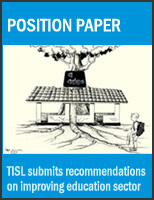 Download Full Position Paper: English [pdf]
Download Full Position Paper: English [pdf]
In the best interest of the country, the Government needs to ensure that decisions on education are objective, equitable and free of biases and prejudices. The executive at all levels should lead as an example and refrain from influencing decisions.
This is among several key recommendations made by TISL to the Government following the release of the Report on Corruption in Education in Sri Lanka based on findings of an in-depth research study on the subject.
Stressing the need for the immediate re-instatement of the Public Service Commission, TISL states that this is vital in order to ensure that only qualified officers are appointed to the Sri Lanka Education Administrative Service (SLEAS) and the Principals’ Service. The study has revealed that due to the appointment of unqualified persons to responsible positions, the standards of education have deteriorated.
Another recommendation highlights that efforts should be made to level inequalities in the distribution of resources to schools, including distribution of teachers. The government should set aside the required resources to provide incentives for teachers to work in disadvantaged areas.
While commending the Education Ministry’s efforts to regularize appointments TISL points out that appointments to positions in the SLEAS, the Principals Service, the Teacher Service, and the Teacher Educator Service, should be made according to the Establishment Code, the Sri Lanka Principal Service Code 1999, and the Teacher Service Code 1995. Excess appointments should be reviewed and brought in line with the cadre formulated in the SLEAS minutes.
TISL points out the need to consider the possibility of introducing a professional educational service, which would ensure (a) the quality of performance of officers, principals and teachers, (b) maintenance of discipline and professional standards and (c) the training of educators and officers.
Addressing the Trade Unions, TISL has stated that unions should support the development of a Code of Ethics for teachers, play an active role in implementing the Code and help ensure ethical behavior of teachers, with the aim of restoring the dignity of the teaching profession.
Unions should also support teachers to comply with regulations, in particular with transfer policies, so that equitable distribution of teachers across regions can be achieved.
The need for teachers to maintain high standards of knowledge and behavior and refrain from any form of unethical behavior has been emphasized. TISL points out that teachers play a crucial role in transmitting values and attitudes to their pupils, and poor salaries and lack of career prospects cannot be an excuse for ethical lapses.
In a Position Paper released by TISL, 29 recommendations have been made to different stakeholders including the Government, the Ministry, Trade Unions, Principals & Teachers, and Parents.
Download & Read Full Position Paper: English [pdf]

